

Male penguin couple steals nest of a female penguin couple at Netherlands zoo. In their ongoing quest to raise a chick, a couple of African male penguins that rose to viral fame last year for stealing an egg from a heterosexual penguin couple have now stolen the nest of two female penguins.
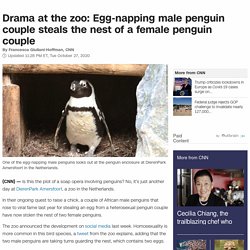
The zoo announced the development on socialmedia last week. Homosexuality is more common in this bird species, a tweet from the zoo explains, adding that the two male penguins are taking turns guarding the nest, which contains two eggs. "After obtaining an egg to hatch last year, they managed to hijack an entire nest this year at an unguarded moment," zookeeper Sander Drost is quoted as saying in a news release. The two penguins are "a dominant couple" among the 17 penguins in the zoo's care, Drost told Dutch News. Drost called the male penguin couple "very determined" -- but their desire to become fathers might still not come to fruition, because the eggs were taken from a same-sex female couple and therefore are most likely unfertilized. Rising Seas: Record Warmth Found at 'Doomsday Glacier' Water Line. This site may earn affiliate commissions from the links on this page.
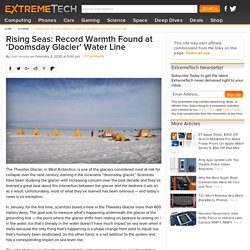
Terms of use. The Thwaites Glacier, in West Antarctica, is one of the glaciers considered most at-risk for collapse over the next century, earning it the nickname “doomsday glacier.” Antarctica's biggest glacier still losing ice, thinning in a new way. New ‘Arctic paradox’ emerges, as economy and ecology seek balance. As the world pushes for stronger climate measures to stop the destruction of the Arctic, many countries are also keen to take advantage of the region’s new opportunities in shipping, mining, drilling and security.
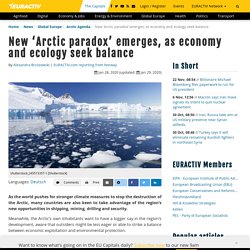
Meanwhile, the Arctic’s own inhabitants want to have a bigger say in the region’s development, aware that outsiders might be less eager or able to strike a balance between economic exploitation and environmental protection. ‘No-mans land’? A few months ago, the Norwegian ministry of foreign affairs was left baffled by rather remarkable statements from the French Defence Minister Florence Parly, who presented the brand new French defence strategy for the Arctic. In its preamble, the new strategy document states, “the Arctic belongs to no-one” and “only cooperation between states will lead to meaningful results”, and went on to quote former French Prime Minister Michel Rocard comparing the Arctic to a lawless Middle East. “Those claims are completely false. How biology creates networks that are cheap, robust, and efficient. From veins that deliver oxygen to tissues to xylem that send water into stems and leaves, vascular networks are a crucial component of life.
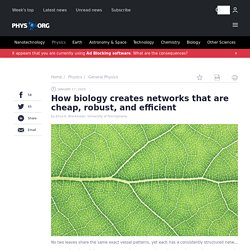
In biology, there is a wide range of unique patterns, like the individualized structures found on leaves, along with many conserved structures, such as named arteries and veins in the human body. These two observations led scientists to think that vascular networks evolved from a common design, but how, exactly, could nature create so many complex structures from a single starting point? Predicting coexistence in experimental ecological communities. Global no net loss of natural ecosystems. Predicting coexistence in experimental ecological communities.
Study explores the density of the tectonic plates and why they sink in the Earth's mantle. Predicting coexistence in experimental ecological communities. Consent Form. Our Acidic Oceans Are Eating Away at Sharks’ Skin. I’m Melting As the oceans grow increasingly acidic, they’re claiming yet another casualty: sharks.
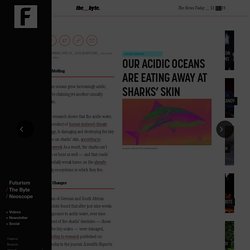
New research shows that the acidic water, a byproduct of human-induced climate change, is damaging and destroying the tiny scales on sharks’ skin, according to Newsweek. As a result, the sharks can’t swim or hunt as well — and that could potentially wreak havoc on the already-fragile ecosystems in which they live. Fast Changes. How an Accident Led to Discovering a New Fundamental Underwater Force. A miscalculated Fluids Lab demonstration leads to a new understanding of how particles accumulate in lakes and oceans.

A team of mathematicians from the University of North Carolina at Chapel Hill and Brown University has discovered a new phenomenon that generates a fluidic force capable of moving and binding particles immersed in density-layered fluids. The breakthrough offers an alternative to previously held assumptions about how particles accumulate in lakes and oceans and could lead to applications in locating biological hotspots, cleaning up the environment and even in sorting and packing. How matter settles and aggregates under gravitation in fluid systems, such as lakes and oceans, is a broad and important area of scientific study, one that greatly impacts humanity and the planet. Positive associations among rare species and their persistence in ecological assemblages.
Capturing Ecology photo competition winners announced. The British Ecological Society runs an annual photographic competition for photos taken by ecologists or students across the world.
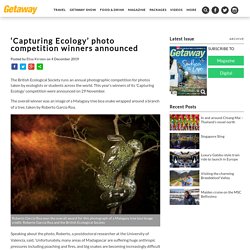
This year’s winners of its ‘Capturing Ecology’ competition were announced on 29 November. The overall winner was an image of a Malagasy tree boa snake wrapped around a branch of a tree, taken by Roberto García Roa. Roberto García Roa won the overall award for this photograph of a Malagasy tree boa Image credit: Roberto García Roa and the British Ecological Society Speaking about the photo, Roberto, a postdoctoral researcher at the University of Valencia, said, ‘Unfortunately, many areas of Madagascar are suffering huge anthropic pressures including poaching and fires, and big snakes are becoming increasingly difficult to see. During my visit to Madagascar, I had the pleasure of finding this outstanding snake and photographing it. Andrew Whitworth took the People and Nature award for this image of a female three-toed sloth crossing a road.
Khristian V. Charles Darwin may be wrong about where life started on Earth, stunning study says. Charles Darwin is credited with the idea that life on Earth evolved in shallow pools of water.

Now, a new study suggests that instead of life originating in a "warm little pond," it may have come from deep-sea hydrothermal vents — an idea that could hold significance for extraterrestrial life. The research, published in Nature Ecology & Evolution, suggests that these deep-sea environments had the heat and alkalinity to start life.
"There are multiple competing theories as to where and how life started," said the study's lead author, University College London professor Nick Lane, in a statement. "Underwater hydrothermal vents are among most promising locations for life's beginnings — our findings now add weight to that theory with solid experimental evidence. " Lane and the other researchers were able to recreate an environment similar to the deep-sea vents, using "protocells with a mixture of different fatty acids and fatty alcohols" that previous unsuccessful experiments did not use. Information limitation and the dynamics of coupled ecological systems. Information limitation and the dynamics of coupled ecological systems. Ecological resilience of Arctic marine food webs to climate change.
Ecological resilience of Arctic marine food webs to climate change. Ecological resilience of Arctic marine food webs to climate change. Ecological resilience of Arctic marine food webs to climate change. Insights into the assembly rules of a continent-wide multilayer network.